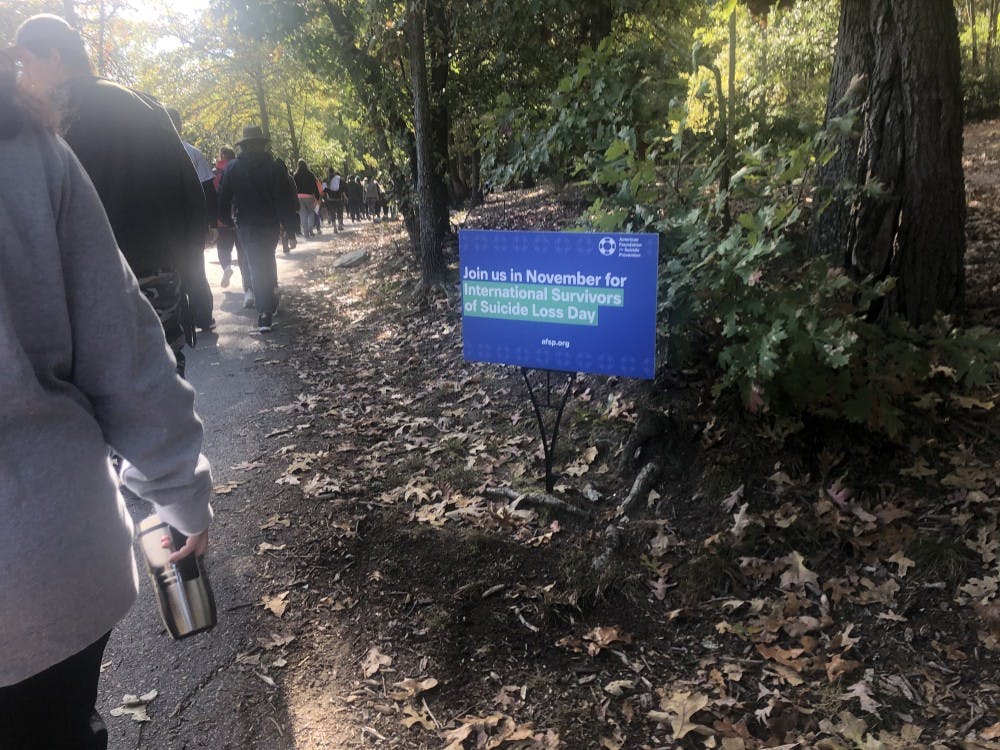Members of the Richmond community gathered to walk in unity at Deep Run Park Saturday morning to honor those lost to suicide and those currently struggling.
Throughout the year, the American Foundation for Suicide Prevention hosts several Out of Darkness walks across the country. This year, the city of Richmond hosted its 10th walk. A turnout record of more than 1,400 people registered to walk.
The walk also set a fundraising record, with more than $100,000 raised. The first walk in 2010 raised $26,000, according to event organizers.
“The money goes towards advocacy, research and education," said AFSP Richmond board chair Stephanie Cole. "So we have a lot of different educational programs to get out in the community and just educate people on the signs of someone that might be struggling … where to point them, different resources, and kind of have a talk about things. And those services are all free.”
Cole also mentioned other initiatives by the AFSP, including sending advocates to the state and national capitals to advocate for mental health legislation, getting a three-digit emergency phone line similar to 911 and conducting research as the number one privately funded suicide prevention organization in the U.S.
CAPS interns Natalie Szumel, senior, and Sally Watanabe, junior, set a goal of raising $500 from the team of students who registered to walk, which they surpassed by raising $750.
Szumel and Watanabe contacted presidents of clubs on campus, as well as the athletics department, to get larger groups involved. CAPS interns tabled with the Panhellenic Council and Interfraternity Council in Tyler Haynes Commons, raising $150 in one day, and also had a fundraiser online to share with friends and family, asking them to donate to the cause.
Szumel said the CAPS interns wanted to get the UR community involved to show support.
“I think the biggest thing is getting out there and showing support for those people," she said. "It’s a tangible way of seeing the people who support you and want you here.”
The walk helps reduce stigma, Watanabe said.
“I definitely think that this is a big step in the stigma about mental health," Watanabe said. "You know, suicide is something that people don’t always wanna talk about, but this kind of just helps bring it into the forefront by acknowledging it, and really getting the community involved. I think that we can all grow stronger from this."
Both CAPS interns also tabled with various other organizations at the walk on Saturday and had mental health resources on display, as well as a canvas decorated with positive affirmations that students had been invited to add earlier in the week.
Enjoy what you're reading?
Signup for our newsletter
Before people started walking the trail, organizers began Saturday morning's event with a solemn yet hopeful ceremony about the issue of mental health and suicide prevention.
After organizers acknowledged the success of this year’s walk, a bead ceremony took place. Those onstage wore different colored beads to represent different people in their lives who they had lost to suicide, and shared their stories with those in attendance.
Some UR students attended the walk to show their support, and were acknowledged by organizers during the ceremony, who thanked the students for their attendance.
Senior Sam Weaver found out about the walk as an Interfraternity Council member who helped table during the week. He said that the large number of people walking had created an upbeat, hopeful environment.
The walk increased a sense of awareness that Weaver will carry into his day-to-day life, he said.
“What stuck out to me was that there were a lot of people, a lot of families there, who had t-shirts on commemorating someone who they’d lost to suicide," Weaver said. "That kind of made me think about how it’s something that affects a lot more people than you think. Like obviously day-to-day people aren’t wearing t-shirts that will let you know something that affects them, so now I might walk around and think, 'There are probably some people I see day-to-day who have been affected by something like that.'"
Weaver said that although it was a difficult thing to measure, he thought that UR had done a good job of encouraging people to talk about depression and mental health. He said that as an international student from the United Kingdom, he had not heard it discussed as much in high school.
Local resident Alexa Shulleeta attended the event and said she was there to support the AFSP as well as for personal reasons, as she had lost people in her life to suicide.
“I think this is actually a really great organization to bring mental health awareness and advocacy to it," Shulleeta said. "This is really not talked about enough, ...so it’s a good avenue. I’m a pediatric physical therapist, so I do see a lot of kids who have mental health issues in their history.”
A strong theme at the Out of the Darkness walk was that nobody is alone in their struggle, and that there are resources available and people who want to help you.
On-campus resources at UR for those struggling with mental health, depression and suicidal thoughts include Therapy Assisted Online Self-Help, CAPS-sponsored periodic groups and workshops on various mental health topics, as well as psychiatric services through CAPS and the Student Health Center and individual counseling both on- and off-campus.
Contact news writer Eileen Pomeroy at eileen.pomeroy@richmond.edu.
Support independent student media
You can make a tax-deductible donation by clicking the button below, which takes you to our secure PayPal account. The page is set up to receive contributions in whatever amount you designate. We look forward to using the money we raise to further our mission of providing honest and accurate information to students, faculty, staff, alumni and others in the general public.
Donate Now



